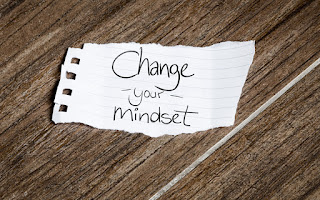Part 3 of 3: Changing Your Mindset
1. Adopt a healthy attitude towards food. Take a hard look at your eating habits.
Do you eat more when you feel stressed? Do you withhold food from yourself in order to feel like you're in control? Try to evaluate whether you have an unhealthy emotional attachment to food. If you do, here are few steps to consider:
- Find a healthier replacement. If you find that you tend to gorge on unhealthy foods when you're stressed, find a substitute activity — for instance, you could instead go for a walk, take a long bath, or call a trusted friend for a chat. Whatever you choose, it should be something that helps you to decompress, so that you no longer feel the need to binge.
- See food as sustenance. A lot of Western culture is rife with messages that food is for entertainment or for relieving boredom. Break yourself of this cognitive habit by consciously evaluating food in terms of what it can do to keep your body healthy. Ask yourself if what you're about to put in your mouth is good for you, and if it will help your body function as it was designed to.
- Consult a medical professional. Eating disorders are classified as mental illnesses, and you can't always just talk yourself into stopping destructive behaviors. If you suspect that you have an eating disorder (whether it's over- or under-eating), ask your general practitioner to refer you the appropriate care.
Read also: 45 Tips How To Live Healthier Life in 2016
2. Determine how many calories your body needs to function each day.
This number can vary widely, depending upon your metabolism and how physically active you are. As a rule, the more muscle mass you have, the more calories you need to consume and to function properly. Otherwise, your body will start breaking down muscle tissue for energy.
If you're the kind of person who puts on 10 pounds just smelling a slice of pizza, then your daily caloric intake should stay around 2000 calories for men, and 1500 calories for women. Your body mass also plays a part in this — more calories are suitable for naturally bigger people, and fewer calories for smaller people.
If you're the kind of person who can eat without putting on a pound, or you're physically active, you may want to increase your daily caloric intake by 1000-2000 calories, a little less for women.
Read aslo: 20 Tips How To Eat Healthy
3. Don't skip breakfast.
Many people do this because they think they can drop pound, or they just don't feel hungry in the morning. Although the scientific evidence is still inconclusive, there are several reasons why you might not want to skip what many people believe is the "most important meal of the day".
Eating breakfast gets your metabolism going and keeps it active throughout the morning. Skipping breakfast may kick off the "starvation response" in some people. Your brain says "There is no food! It has been hours! It must be a famine!" The next time you eat, the body stores as much fat as it possibly can.
Furthermore, skipping breakfast might leave you famished by lunch, causing you to binge as a way to compensate.
A small breakfast is better than no breakfast. If you don't feel up to a full meal, at least drink some water and eat a piece of fruit, a granola bar, or a piece of toast. Get more nutritious bang for your buck by eating a breakfast smoothie.
On the other hand, a technique called "intermittent fasting" has been shown to contribute more rapid weight loss with possibly other health benefits. The effect, however, may vary from individual to individual. However, it may not be a good idea to skip breakfast at the day of an important exam, job interview, or other critical event, where you may be distracted by your hunger or not having enough energy, to perform up to your potential.
4. Eat slowly.
Have you ever gorged on a huge meal and felt fine immediately after, but felt like exploding 15 minutes later? This happens because it takes some time for your stomach to tell your brain that it's full. Circumvent the problem by consuming your food slower. That way, by the time you get the message and start feeling satisfied, you haven't consumed too much extra food.
Slow yourself down by waiting 5 or 10 minutes between each course. Chew each bite of food 20 to 30 times before swallowing.
Drink a full glass of water throughout your meal. Stopping for sips will slow your eating, as well as helping you feel fuller.
Eat five times per day. You may consider eating three meals per day (breakfast, lunch and dinner), with two snacks in between. Doing this allows you to eat slightly less at your meals, giving your body a more manageable amount of food to digest, and keeps your blood sugar steadier throughout the day because you're not going for six hours at a stretch without eating.
You might also like:
- Part 1 of 3: How To Eat Healthy: Choosing a Healthy Diet
- Part 2 of 3: How To Eat Healthy: Making Easy but Healthy Decisions
Source: wikihow.com
















0 nhận xét:
Post a Comment